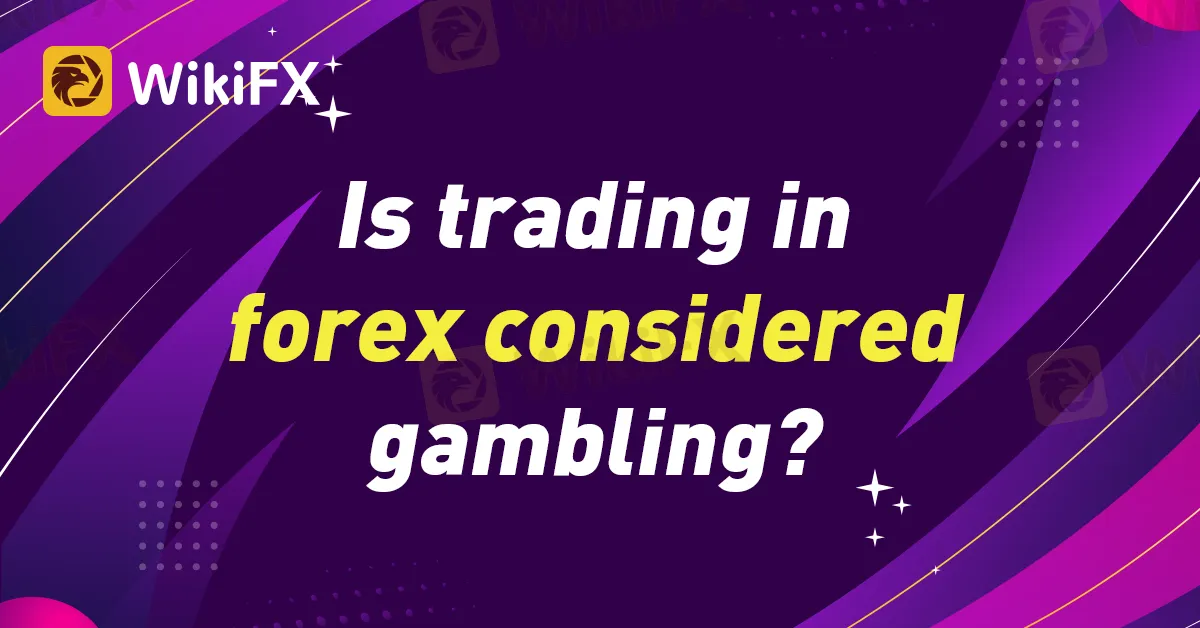简体中文
繁體中文
English
Pусский
日本語
ภาษาไทย
Tiếng Việt
Bahasa Indonesia
Español
हिन्दी
Filippiiniläinen
Français
Deutsch
Português
Türkçe
한국어
العربية
Is trading in forex considered gambling?
Abstract:Many traders who engage in Forex trading treat this full-fledged company as if it were a bet, which is obviously unfavorable. It may appear that there are many similarities between forex trading and gambling. It primarily concerns probability games in both situations. However, the opposite is true because this is the very area in which they differ drastically. We could argue about whether this is true or false for hours, but let's consider the situation from a practical standpoint instead. Let us give you a few illustrations to demonstrate why trading forex is not gambling.

Many traders who engage in Forex trading treat this full-fledged company as if it were a bet, which is obviously unfavorable. It may appear that there are many similarities between forex trading and gambling. It primarily concerns probability games in both situations. However, the opposite is true because this is the very area in which they differ drastically. We could argue about whether this is true or false for hours, but let's consider the situation from a practical standpoint instead. Let us give you a few illustrations to demonstrate why trading forex is not gambling.
WikiFX removes the element of chance from trading. Before using a broker, traders can rate and review them on WikiFX, a forex broker enquiry app. Both the appstore and playstore offer the WikiFX application.
French roulette versus trading
European roulette
Everyone who has ever indulged in some form of gambling has probably come across the infamous French roulette.
A player receives a payout in the ratio of 1:36 (36 times the amount bet) if they correctly guess a number, so if we take into account probability theory, the playing area consists of 37 numbers, including zero. Given that a player loses an average bet after 37 rounds of play, it is already obvious that they will always be at a disadvantage.
Trading
In contrast, traders are typically not at such a disadvantage when they engage in trading. Any position a trader opens will have the same chance of making a profit as losing money if they proceed entirely arbitrarily and do not research the markets. Because of this, trading differs significantly from gambling in that it does not automatically disadvantage the trader from the start. Instead, the probability of success is ultimately influenced by the trader's own abilities and skills.
Why do some people still view trading as a gamble?
Using unsuitable brokers when trading (MM, DD)
MarketMaker (MM) or DealingDesk (DD) are brokerage companies that, as their names imply, are active market makers. As a result, these brokerage companies frequently act as counterparties to trades that their own clients execute. Therefore, if a trader makes money, these brokers lose money. This frequently directs DD and MM brokers to the methods employed by gambling businesses, and traders regrettably eventually come to believe that trading is merely a cloaked form of gambling.
The position of trading at a chance level
Blind trading, or trading without conducting any kind of analysis or developing a detailed plan, frequently leads to both rapid and uncontrollable trading losses and the big unknown. Gamblers frequently exhibit similar behaviors. Even though they typically follow a method, a thorough market analysis would reveal that it is extremely challenging, if not downright impossible, to be successful in that gambling “market.” One of the first tasks required is creating analysis and a strategic plan for marketplaces like gambling, forex, and others. We can only determine whether the market is appropriate for us and our strategy through this.
Conclusion
There you have it, then. The appropriate decision and personal attitude, in addition to probability, have a big impact on traders and whether they view trading as gambling or not. Let's sum up this article by stating:
“While the casino is always the primary architect of luck in gambling, the trader himself controls luck in trading.”

Disclaimer:
The views in this article only represent the author's personal views, and do not constitute investment advice on this platform. This platform does not guarantee the accuracy, completeness and timeliness of the information in the article, and will not be liable for any loss caused by the use of or reliance on the information in the article.
Read more

Trading Lessons Inspired by Squid Game
The popular series Squid Game captivated audiences worldwide with its gripping narrative of survival, desperation, and human nature. Beneath the drama lies a wealth of lessons that traders can apply to financial markets. By examining the motivations, behaviours, and strategies displayed in the series, traders can uncover valuable insights to enhance their own approach.

How Far Will the Bond Market Decline?
Recently, the yield on the U.S. 10-year Treasury bond reached a new high since April 2023, soaring to 4.7%.

Rising Risk of Japan Intervening in the Yen's Exchange Rate
The Japanese yen faces both internal and external pressures, with a potential intervention by the Japanese government looming.

Is the stronger dollar a threat to oil prices?
Oil prices dropped more than 1% on Wednesday, mainly due to the strengthening of the dollar and the increase in U.S. fuel inventories, which collectively suppressed the price rise.
WikiFX Broker
Latest News
SQUARED FINANCIAL: Your Friend or Foe?
Big News! UK 30-Year Bond Yields Soar to 25-Year High!
High-Potential Investments: Top 10 Stocks to Watch in 2025
Why Is Nvidia Making Headlines Everywhere Today?
Discover How Your Trading Personality Shapes Success
US Dollar Insights: Key FX Trends You Need to Know
FINRA Charges UBS $1.1 Million for a Decade of False Trade Confirmations
BI Apprehends Japanese Scam Leader in Manila
Bitcoin in 2025: The Opportunities and Challenges Ahead
Join the Event & Level Up Your Forex Journey
Currency Calculator






